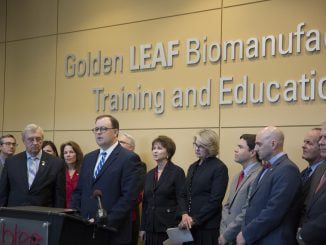
RALEIGH — A new report by the James G. Martin Center shows administrative staff added at higher rates than teaching faculty and student enrollment in the UNC System. The report examines faculty, nonfaculty and student enrollment percentage rates from 2015-16 to 2024-25.
“The data show a clear trend: administrative growth has exceeded instructional growth at nearly every institution,” Jenna Robinson, president of the Martin Center, said in a press release. “This expansion raises important questions about institutional priorities and whether resources are being directed toward the core academic mission.”
Across the UNC System, nonfaculty staff increased by 14.6%, outpacing faculty growth (9.5%) and student enrollment growth (10.2%_) during the decade, according to the 28-page report.
Two schools that stood out in the data were Appalachian State and Winston-Salem State.
Appalachian State had a 25.4% decrease in nonfaculty staff, while faculty grew by 20.5% during the period covered by the report.
Winston-Salem State University had a faculty decline of just under 30%, whereas nonfaculty grew by over 11%.
The report highlights a trend toward expanding administrative and support functions, such as Fiscal Affairs, Academic and Student Affairs and Information Technology, over instructional roles.
Faculty salary expenditures rose by 44.78%, and nonfaculty salary expenditures increased by 55.53%. The report notes that spending outpaced the Consumer Price Index increase of 32.72%.
Fiscal Affairs saw the biggest staff increase, with a 53.8% rise in headcount (from 1,343 to 2,065 employees) and the highest expenditure rate of nearly 91%.
In remarks to the UNC Board of Governors in April, UNC System President Peter Hans said he would be “directing a reduction in administrative costs” at UNC schools where “spending
growth is outpacing state salary adjustments and increases or declines in student credit hours.”
Hans also noted that the UNC System has kept “tuition flat for nine years in a row,” for in-state undergraduate students.
That nine year streak may change as the General Assembly budget process plays out. The House education budget proposals include requiring the UNC Board of Governors to increase undergraduate increase undergraduate and graduate tuition rates to “produce at least $30 million in additional receipts in FY 2026-27.” The increase would not impact the NC Promise tuition program.
An analysis by the public policy think tank American Enterprise Institute shows a concentration of administrative bloat at mainly top private universities and colleges.
National data on administrative bloat in higher education suggests that expected future falling enrollment rates may further increase the percentage gaps between nonfaculty staff and teaching staff or cause schools to close their doors.
Data from the National Center for Education Statistics (NCES) for 2022–23 says the average total cost of attendance for at a four-year school for full-time undergraduate students was “higher at private nonprofit institutions ($58,600) than at private for-profit institutions ($33,600) and public institutions ($27,100).”
NCES data also shows that the all-institution cost for a four-year degree, which included tuition, fees, and room and board, has exponentially increased over the years, jumping more than 2,300% from 1963 to 2023. In 1963-64, the cost was $1,286. By 1980, the cost had more than doubled to $3,167. By 2022-23, that cost was $30,884.
The private school starting and ending rates for the same years were higher, at $1,810 in 1964 and $49,654 in 2023; an overall increase of 2,564%.



